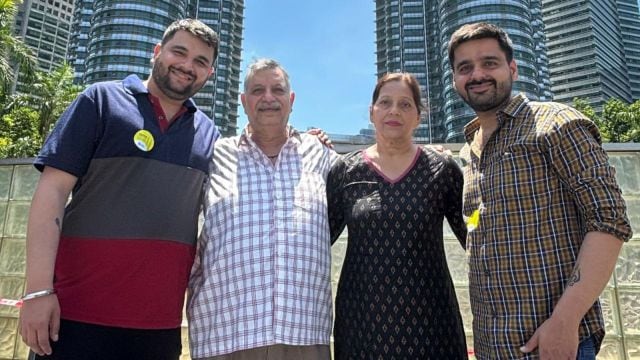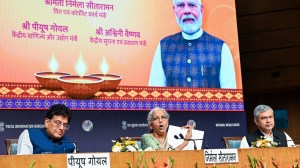“How does it feel when a few men are yelling, throwing things, and holding guns at you? It felt like my life was over. There was hope when we landed at the Amritsar airport, but it turned into disappointment and fear when we took off. We felt betrayed, scared for our lives.” Chander Chhabra still recalls the agonising details of his ordeal aboard the IC 814 Indian Airlines flight that was hijacked by five Harkat-ul-Mujahideen members on December 24, 1999.

The Kathmandu-Delhi flight with 179 passengers on board was taken over shortly after it entered the Indian airspace. The aircraft also carried 11 crew members, including Captain Devi Sharan, first officer Rajinder Kumar, and flight engineer Anil Kumar Jaggia.
Story continues below this ad
“I boarded the IC 814 flight on December 24 and I remember that it had been 40-45 minutes. I was thinking that the flight was about to land in India in the next 30-40 minutes. But then, 4 to 5 men suddenly started yelling and throwing things haphazardly. They started yelling at us (passengers) to put our heads down and stay quiet. It was then that I saw guns and knives in their hands, and I soon realised that our flight had been hijacked,” Chhabra told indianexpress.com.
Soon, two hijackers went to the cockpit and announced that the plane had been hijacked. “It’s a harrowing experience that I would not wish on anyone. A sudden fear took over my body as soon as I heard that announcement. We were expecting an announcement of landing to be made but instead, we were told that our lives were in danger and we may not even survive,” he said.
From feeling safe to betrayed
Shortly after the hijackers took control of the plane, they forced a few passengers, whom they assessed as strong enough to be a danger, to shift to the business class of the aircraft. “I was one of those 15-20 people forcefully taken to business class. Three hijackers started picking out a few of us whom they thought were strong enough to pose a threat to them. At that moment, I felt like this might be our end and my only objective was to get out of that business class by hook or by crook,” Chhabra recalled.
He remembers hearing heated arguments between the pilots and the hijackers about rerouting the plane towards Lahore, and then pilots trying to explain to the hijackers that they did not have enough fuel. A little while later, the passengers held at gunpoint and tied up in the business class seats heard the hijackers yelling at and threatening the pilots. They learned that the plane was landing but were unaware of the destination.
Story continues below this ad
“It was a few minutes later that we got to know through murmurs and the hijackers’ discussions that our plane had landed at the Amritsar airport, and in that moment, I felt safe,” recalled Chhabra, a father of four.
“I remember that feeling of safety very clearly. I thought to myself that nobody could take us away from this airport now because we had landed in India. I was very sure that our government would not let them take off again and soon I will be home with my four children, my mother and wife. I remember feeling safe…and then, suddenly, betrayed,” he added.
Chhabra said that when the plane took off from Amritsar, he was scared about the future of his family. With this in mind, he became more determined to exit the business class as he assumed he was in grave danger if he did not escape. “Rupin Katyal was tied in the same row as me in the business class and when I saw them attacking Katyal and Satnam Singh, I told myself that my priority has to be to get out of this area,” he said.
Getting out of business class
Putting his plan in motion, Chhabra repeatedly requested the hijackers to let him use the washroom but his requests were always met with some yelling, threats and intimidation. But Chhabra remained persistent and one of the hijackers signalled him with his pistol to quietly get up and go to the washroom.
Story continues below this ad
“I knew this was my chance. I chose the washroom that was closer to the economy class, and while exiting the washroom, I pretended that I was fainting and quickly fell on the first aisle seat in the economy class, which was thankfully empty. I fell half on the floor and half on the seat and ended up hurting my ribs. But I closed my eyes and pretended to be unconscious. One of the hijackers tried waking me up but then gave up within minutes as though he believed me. A few minutes later when I sensed that the hijackers were not looking at me, I partly opened my eyes and signalled my fellow passengers to remain quiet,” he recalled.
While Chhabra was in pain, he was also relieved to have gotten out of business class. He was still scared for his life though, he said, as the hijackers did not let them open the windows or talk to their co-passengers. Being kept in the dark and quiet for several days left them with no hope for their future, he said.
“I remember when we got to know that the hijackers were leaving us. It was the first time since they had taken control of our lives that they let us open the windows, see some light, eat something and talk to each other. For the first time on that flight, I had something to eat other than that one slice of orange I had earlier. I just wanted to rush home and hug my children, meet my family, let them know I was okay,” he said.
‘Netflix series failed to show the truth’
Chhabra says he has seen all the documentaries, series, movies etc on the hijacking but the latest Netflix series IC 814: The Kandahar Hijack left him unimpressed. He believes that the series has tried to show the hijackers in a humane light, which the passengers never witnessed during the hijack.
Story continues below this ad
“How can a hijacker be humane? Do you think someone who has hijacked a plane and is holding over 100 people at gunpoint, beating them, and keeping them without food or water, has human emotion? Do you think they have humanity? We never saw any trace of humanity in them,” he said.
“In the Netflix series, the hijackers are shown handing out food and water to the passengers. I ate one slice of an orange during all the days when they held us captive. We got to taste some food only when their demands were met to a certain extent. They attacked my fellow passengers in front of my eyes and tied us to our seats…and you want me to believe that they had humanity in them? Bollywood has the power and responsibility to show the truth, and this was not the truth,” said Chhabra.
A forever fear of flights
Even though it has been almost 25 years since the hijacking took place, Chhabra says he and his family are still struggling to put the incident behind them. After the incident, Chhabra stopped travelling via flights for at least 10-15 years.
“It took me a lot of time to build up the courage to air travel again. I think I took my first flight after nearly 15 years. I could not muster up the courage to fly otherwise. Not just me, even my family developed a fear of flying after that incident,” he said.
Story continues below this ad
His son Rahul, 32, recalls seeing his mother and grandmother cry during this tragedy. Nobody in his house ate when his father was stuck inside the plane, he says. While his mother, brother and his father’s elder brother started visiting the airport every day asking about his father, a small video filled them with hope, he recalls.
“There was a very small clipping where we spotted our father coming out and waving to the camera. It gave us so much hope and happiness. We threw a huge party at home when he came back. It was a second Diwali for us,” he recalled.
The family has started air travel again but are always on the alert as soon as they enter an airport. “A small turbulence, a long glare by someone, a little commotion, slight delay – anything can trigger that fear in us. We are all scared of the idea of flying now but we are trying to fight it…one day at a time,” Rahul said.









